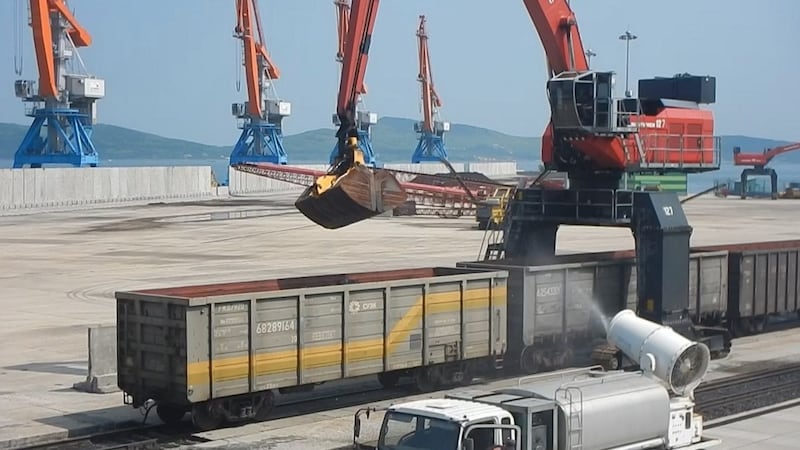Updated Feb. 11, 2025, 01:46 a.m. ET.
TAIPEI, Taiwan – Russia would welcome North Korea resuming talks with the United States, the Russian ambassador in Pyongyang said, adding that while dialogue was better than no contact at all, North Korea got “practically nothing” from its previous engagement with the U.S.
As President Donald Trump begins his new term, expectations are growing that he might resume attempts to engage with North Korean leader Kim Jong Un. The two met three times during Trump’s first term but their unprecedented talks brought no progress on persuading North Korea to give up its nuclear weapons in exchange for sanctions relief.
“Dialogue in the extremely complex situation unfolding around the Korean peninsula is, in any case, better than the complete absence of any contact,” said Aleksandr Matsegora, as cited by Russia’s state-run Rossiyskaya Gazeta newspaper.
“If Pyongyang decided to resume talks with the U.S., we would only welcome it,” Matsegora added.
The diplomat, however, appeared to play down hopes for progress if Trump and Kim were to meet again.
“It is important to take into account the extremely unsuccessful experience of the previous attempt to negotiate with Donald Trump, when the leader of the DPRK took very broad, unilateral, and sincere steps toward his opponent, receiving practically nothing in return,” he said.
The Democratic People’s Republic of Korea, or DPRK, is North Korea’s official name.
He also blamed the U.S. and its ally South Korea for raising tensions on the Korean peninsula by pursuing a policy of “extended deterrence,” adding that the denuclearization of North Korea had completely lost its relevance.
“They will have to completely recalibrate their approach,” said Matsegora, referring to the U.S. and South Korea, without elaborating.
Matsegora’s remarks came after Trump and Japanese Prime Minister Shigeru Ishiba met in Washington on Friday and reaffirmed their resolute commitment to a North Korea without nuclear weapons, while underscoring the importance of trilateral cooperation with South Korea.
In its latest salvo against the allies, North Korea’s defense ministry described the recent arrival of a nuclear-powered U.S. submarine in South Korea as an example of America’s “invariable hysteria for confrontation,” adding that the U.S. was “openly ignoring” North Korean security concerns.
North Korea’s armed forces “are ready to use any means to defend the security and interests of the state and the regional peace,” the ministry said in a statement Tuesday.
North Korean help to Russia
Russia and North Korea have strengthened their relations over recent years with the North supplying Russia with large volumes of weapons for its war in Ukraine, as well as some 12,000 troops helping Russian forces in its Kursk region, the U.S., Ukraine and South Korea say.
Neither North Korea nor Russia has acknowledged the supply of North Korea weapons and troops and Matsegora did not refer to those issues.
He did, however, say that hundreds of Russian soldiers wounded in Ukraine were undergoing rehabilitation in North Korean hospitals.
“The treatment, the care, the food – everything related to staying in North Korea was absolutely free. When we offered to compensate our friends for at least part of their expenses, they were genuinely offended and asked us never to do it again,” he said.
Ukraine estimates that about 4,000 of the North Korean troops sent to Kursk late last year had been killed or wounded.
Matsegora also said that orphans of Russian soldiers killed in Ukraine were hosted at the Songdowon International Children’s Camp in North Korea last summer.
Russian President Vladimir Putin thanked North Korean leader Kim for organizing the children’s stay during his visit to Pyongyang in June.
RELATED STORIES
North Korea likely to produce drones with Russian support this year: report
North Korea vows to bolster nuclear forces as US, Japan hold summit
North Korea’s new map erases South Korea, signaling policy shift
Deepening ties
Matsegora also noted that Russia and North Korea were expanding bilateral cooperation with a focus on education, trade, transport and economic collaboration.
One initiative is the promotion of the Russian language in North Korea, he said.
North Korea has historically prioritized Russian and Chinese in its foreign language education, reflecting its Cold War alliances. However, since the 1990s, English has gained prominence as a key language for diplomacy and international communication.
The ambassador added that the Russia-North Korea transport project “RasonKonTrans” had resumed operations, handling more than 600,000 tons of Russian coal through the North Korean port of Rajin for shipment to China.

RasonKonTrans, a logistics venture launched in 2008, facilitates Russian coal and goods transport through North Korea’s Rajin port to China and beyond. Russia invested in modernizing Rajin’s infrastructure, including the Rajin-Khasan railway.
However, operations faced disruption due to sanctions, nuclear concerns, and the COVID-19 pandemic. Critics argue the transport links help North Korea evade sanctions.
Edited by Mike Firn.
Updated to add comment from North Korea’s defense ministry.
